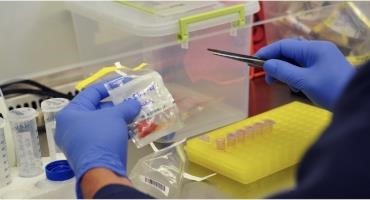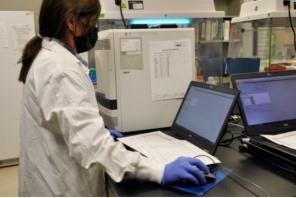Recent reports of African Swine Fever (ASF) outbreaks in the Dominican Republic and Haiti have heightened surveillance efforts for the highly contagious viral swine disease in the United States.

Shuping Zhang
University of Missouri’s Shuping Zhang, professor and director of the Veterinary Medical Diagnostic Laboratory (VMDL) in the MU College of Veterinary Medicine, explains the dangers of ASF and the role the VMDL plays in testing for the virus to help protect animal health and the country’s agriculture industry.
What is African Swine Fever and why is it so concerning?
ASF is a highly infectious and deadly viral disease that affects both domestic and wild swine. It originated in Africa but has since spread to Europe, Asia and recently to the Caribbean.
An outbreak in the U.S. would be devastating to our economy, particularly the agriculture industry. Governments often block pork imports from countries with confirmed cases of ASF, so there would be enormous economic consequences if we were unable to continue exporting pigs and pork products abroad. A 2018 outbreak in China, where half of the earth’s pigs are located, killed more than 100 million pigs.
Have there been any confirmed cases in the U.S. yet and can humans get sick from eating pork contaminated with African Swine Fever?
The good news is there has never been a confirmed case of ASF in the U.S., and we hope to keep it that way. Also, it is not a zoonotic disease; So it is not possible for humans to get sick from ASF by eating contaminated pork.
What symptoms should pig farmers look out for?
The clinical signs of ASF include high fever, lethargy, depression, skin discoloration, and possibly vomiting and diarrhea. Other signs to look for include swollen or enlarged spleens and lymph nodes.

The MU Veterinary Medical Diagnostic Laboratory receives swine tissue samples from across Missouri to conduct tests for African Swine Fever.
What role does MU’s Veterinary Medical Diagnostic Laboratory play in monitoring African Swine Fever?
The VMDL collaborates with the U.S. Department of Agriculture, state veterinarians and pork producers to conduct general surveillance testing and testing of sick pigs. We receive swine tissue samples from swine farms and slaughter houses across Missouri.

The Veterinary Medical Diagnostic Laboratory has communication plans in place to alert officials in the event a test comes back positive.
After receiving samples, we produce test results within 6 hours and if a test were to come back positive, we have plans to alert state and federal authorities within minutes. That way, decisions regarding quarantining and the imports or exports of pork products can be made immediately to protect United States trade interests and quickly identify the extent of the outbreak.
What is the Veterinary Medical Diagnostic Laboratory’s testing capacity?
We have been testing for ASF for many years. Currently, we have six staff members who are certified to test for ASF and eight polymerase chain reaction (PCR) machines for ASF testing. Our current capacity is about 1,500 test samples per day. But, if an outbreak were to occur, we could immediately increase our capacity given our resources.
How does the Veterinary Medical Diagnostic Laboratory help protect the state’s agriculture industry?
There are 60 labs across the country that are part of the National Animal Health Laboratory Network (NAHLN). The MU VMDL is the only NAHLN Level 1 lab in Missouri, the highest level a lab can achieve, and the only animal health lab in Missouri that is accredited by the American Association of Veterinarian Laboratory Diagnosticians.
We take pride in our responsibility and obligation to protect both animal health and the agriculture industry, which is very important for Missouri’s economy. By testing for and diagnosing viruses, bacteria and pathogens, we help Missourians stay safe while training the next generation of veterinarian diagnosticians and supporting the university’s research mission.
Source : missouri.edu